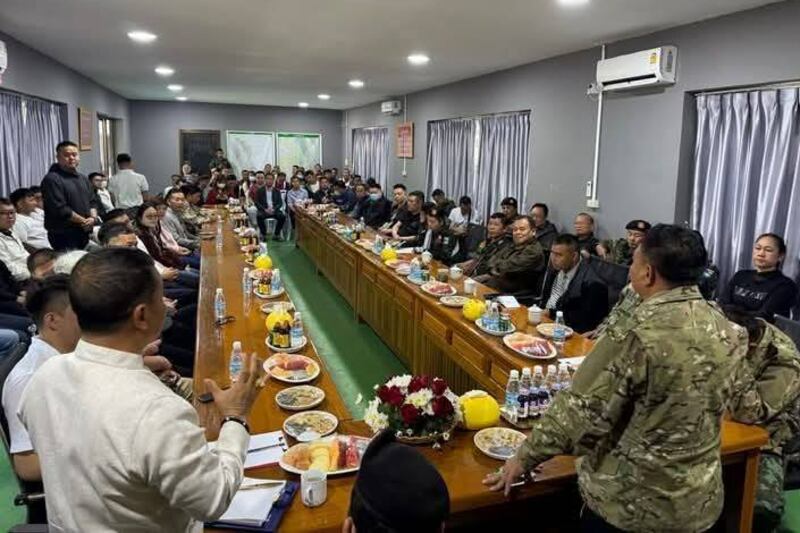Pro-junta militia leaders in Myanmar and operators of online scam centers have agreed to stop human trafficking after the rescue of a Chinese actor this month raised international alarm about their operations and looks set to damage Thailand’s tourist industry.
The ethnic Karen militia force based on Myanmar’s border with Thailand is suspected of enabling extensive internet fraud, human trafficking, forced labor and other crimes, and is being enriched by a business network that extends across Asia, a rights group said in a report last year.
But the case of Chinese TV actor Wang Xing, rescued this month from the notorious KK Park scam facility in eastern Myanmar’s Myawaddy, has brought the issue to public attention across Asia like never before.
The result has been pressure from both the Thai government and the Myanmar military, leading to a meeting on Wednesday between the militias and their business partners in which they agreed to stop human trafficking, said a businessman close to the ethnic Karen militia.
“The current issue of the Chinese actor has brought pressure from Thailand and the junta council in Naypyidaw. That’s why the meeting was held to enforce rules,” the businessman, who declined to be identified as talking to the media, told Radio Free Asia.
Leaders of Myawaddy-based Border Guard Force, or BGF, and the Democratic Karen Buddhist Army, or DKBA, which control the border zone under the auspices of the Myanmar military, agreed on a set of five rules with the business leaders, many of them ethnic Chinese, the businessman said.
The list includes no use of force, threats or torture, no child labor, no income from human trafficking and no scam operations, according to a copy of the rules that the businessman cited. Anyone found breaking the rules will lose their business and be expelled from the area.
RFA tried to contact senior members of the ethnic Karen forces, Maj. Naing Maung Zaw of the BGF and Lt. Gen Saw Shwe Wa of the DKBA, but neither of them answered their telephones.

The Karen militia force in power in the eastern region emerged from a split in the 1990s in Myanmar’s oldest ethnic minority guerrilla force, the largely Christian-led Karen National Union, when Buddhist fighters broke away, formed the DKBA and sided with the military.
The military let the DKBA rule in areas under its control in Kayin state, set up a Border Guard Force to help the army, and to profit from cross-border trade, and later from online gambling and scam operations.
RELATED STORIES
Lao teen says she’s been released from Chinese scam center in Myanmar
Scammers lure jobseeking Hong Kongers to Myanmar from Japan, Taiwan
Tricking investors
The scam centers in Myanmar, Cambodia and Laos have ensnared thousands of human trafficking victims from all over Asia, and as far away as Africa.
Many victims say they were lured by false job offers, then forced to scam people by convincing them over the phone or online to put money into bogus investments.
University of Texas researchers estimated in a report in March last year that scammers had tricked investors out of more than US$75 billion since January 2020.
People forced to work at the scam centers are often tortured if they refuse to comply, victims and rights groups say.
The rules announced by the militias and scam operators come after a string of high-profile kidnappings, including that of Chinese actor Wang.
Hong Kong authorities have sent a task force to Thailand in a bid to rescue an estimated 12 victims in Myanmar and have imposed a yellow travel advisory for Thailand and Myanmar, warning of “signs of threat,” but without mentioning the scam parks.
The Bangkok Post reported on Wednesday that Thai hotels and airlines have been getting a flood of cancellations from Chinese tour groups for the upcoming Lunar New Year holiday.
Authorities in the region have accused Chinese gangsters of organizing the centers but Chinese nationals in Thailand said Chinese state-owned companies were behind operations in Myanmar, and behind them is the ruling Chinese Communist Party’s United Front Work Department.
“Wherever you have these scam parks, you will find Chinese companies plying the biggest trade,” a realtor who only gave the surname Pan for fear of reprisals recently told RFA Mandarin. “The Myawaddy park was built by Chinese state-owned companies.”
Pan said the parks were the criminal face of the ruling Chinese Communist Party’s United Front outreach and influence operations.
“All of the big bosses are back in China,” he said.
The Justice for Myanmar human rights group has accused governments and businesses across the region of enabling the cyber scam operations by failing to take action against the profitable flows they generate.
Edited by RFA Staff.
